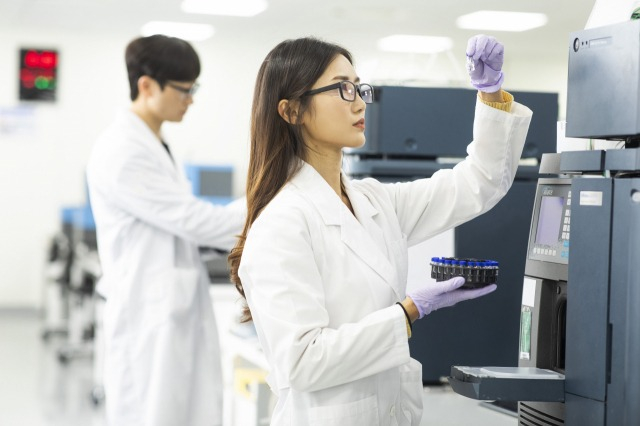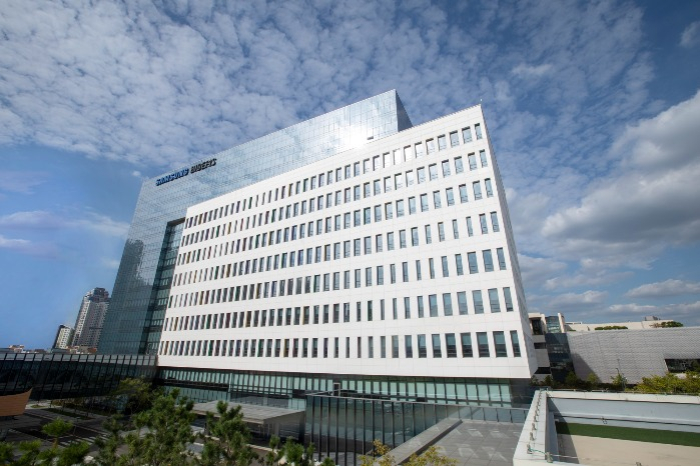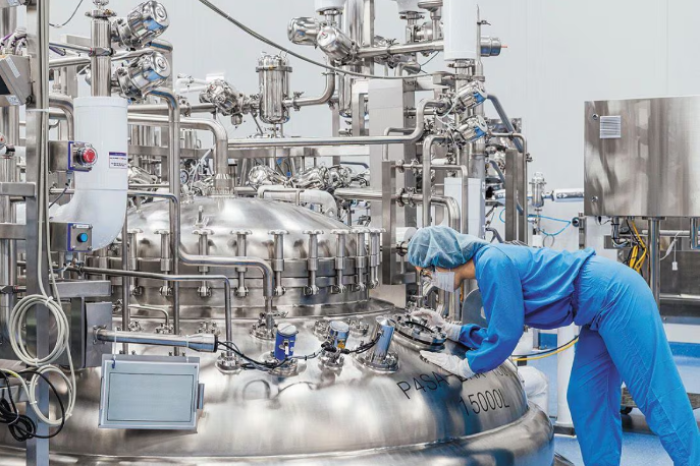Bio & Pharma
Samsung begins new drug development for rare diseases
It seeks a future cash cow beyond its main bio businesses, which are biosimilars and contract manufacturing
By Mar 24, 2024 (Gmt+09:00)
3
Min read
Most Read
LG Chem to sell water filter business to Glenwood PE for $692 million


KT&G eyes overseas M&A after rejecting activist fund's offer


Kyobo Life poised to buy Japan’s SBI Group-owned savings bank


StockX in merger talks with Naver’s online reseller Kream


Meritz backs half of ex-manager’s $210 mn hedge fund



Samsung Bioepis Co., a biosimilar development unit of South Korea’s top conglomerate Samsung Group, has begun its new drug development business with gene therapy pipelines to spur the company’s long-term value creation.
The company entered a preclinical stage with multiple gene therapy candidates targeting rare diseases earlier this year, pharmaceutical industry sources said on Sunday.
Gene therapy treats or prevents diseases by replacing mutated genes or altering malfunctioning genes.
Samsung Bioepis plans to file an investigational new drug (IND) application to conduct a phase 1 clinical trial next year, targeting rare diseases including liver and metabolic illnesses. The company will also develop new drugs by using antibody-drug conjugates (ADCs).
New drug development will be the biggest challenge for the group to take on since the conglomerate started its bio business by launching contract drug manufacturer and biosimilar producer Samsung Biologics Inc. in 2011 and the biosimilar developer Samsung Bioepis in 2012.

NICHE MARKET WITH POTENTIAL
It hasn’t been easy for the Korean conglomerate to start a new drug business, a pharmaceutical industry official said. “Unlike chips, smartphones and home appliances which tend to pay off after investing in research and development, new drug development takes more than 10 years and a significant amount of capital. Furthermore, the success rate is less than 10%,” the official added.
The conglomerate is eyeing the niche market for rare diseases as some countries offer benefits on clinical research, allowing speedy procedures for development, and there is a big growth potential for treatment for uncommon illnesses.
The group is expected to face limited growth of its current bio businesses, contract manufacturing of drugs and biosimilar development and production, amid intensifying global competition.
“The operating margin for biopharmaceutical contract manufacturing is 30-40%, while the figure for new drug businesses is more typically more than 50%,” said Seoul-based Shinyoung Securities Co. analyst Choung Yu-kyung.
"The family owner of Samsung Group has a deep understanding of suffering from rare diseases as some members of the founding family had a rare genetic disease called Charcot-Marie-Tooth disease,” a bio industry source said.

Samsung Group had considered buying global new drug developers, rather than developing its own drugs.
“With our existing businesses, there is a limit to grow as a company with 20 trillion-30 trillion won of annual revenue (from the current 3 trillion-4 trillion won). We have no choice but to acquire a new drug maker to leap forward,” Samsung Biologics Chief Executive John Rim said at a press conference last October.
But the group has shifted to the development of its own drugs as Samsung Electronics Co. has lost ground to its rivals in fiercer competition for artificial intelligence chips, leaving the conglomerate unable to afford to invest a huge amount of capital for the bio affiliates’ mergers and acquisitions.
The conglomerate has prepared for new drug development via its Samsung Life Science Fund of 170 billion won, co-created by the group’s de facto holding firm Samsung C&T Corp., Samsung Biologics and Samsung Bioepis.
Among the fund portfolios are US biotechs Jaguar Gene Therapy and BrickBio. The fund will invest in US gene therapy developer Latus Bio in the second quarter of this year.
The group expects its biosimilar sales to become a cash cow for new drug development.
Samsung Bioepis has developed seven commercialized biosimilars in autoimmune, oncology, ophthalmology and hematology. The company has 28 global clinical trials, one of the largest numbers for an Asian drug developer excluding Japanese.
Samsung Bioepis posted 1 trillion won in revenue and 205.4 billion won in operating profit last year. The company expects great synergy effects between its parent Samsung Biologics as gene therapy drugs can be mass-produced, a Samsung official said.
Write to Dae-Kyu Ahn and Jeong Min Nam at powerzanic@hankyung.com
Jihyun Kim edited this article.
More to Read
-
 Bio & PharmaSamsung targets gene therapy sector through US investments
Bio & PharmaSamsung targets gene therapy sector through US investmentsFeb 27, 2024 (Gmt+09:00)
2 Min read -
 Bio & PharmaSamsung Biologics signs ADC CDO deal with LegoChem Bio
Bio & PharmaSamsung Biologics signs ADC CDO deal with LegoChem BioFeb 07, 2024 (Gmt+09:00)
3 Min read -

-
 Bio & PharmaSamsung Biologics wins $242 mn order from Bristol Myers Squibb
Bio & PharmaSamsung Biologics wins $242 mn order from Bristol Myers SquibbSep 18, 2023 (Gmt+09:00)
1 Min read
Comment 0
LOG IN


